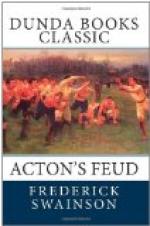He wound up his awful farrago in one glorious burst of solemn fury—
“And even Fate
girds on her sword, and her right arm she stiffens,
As thunders to the icy
pole the glorious name of Biffen’s.”
When Sharpe finally made his bow, according to the invariable custom, every junior except a Biffenite imitated with rare fidelity the mixed sensations of channel passengers after a stormy passage.
Sharpe, cheered to the echo by the Biffenites on the front row, went proudly off.
The Dervishes were received with enthusiasm, and went through their performance to the shouts of “Well wriggled, Java!” “Why don’t you oil!” “Do it again—orang-outang!” They amiably smiled acknowledgments as they backed away.
Then I myself stepped on to the stage, prepared to judge the two-minutes’ rounds. Grim had whipped up sixteen fags, each willing to do battle for the honour of his house. The rounds proceeded to the accompaniment of ear-splitting encouragement, and I had the satisfaction of knowing that not a solitary one of the defeated heroes thought he had really been beaten on points.
No mistake about it, Biffen’s had a fag who could sing. Thurston’s “My First Cigar” only lacked one thing—it should have lasted a little longer to suit the audience.
“She called it an Intimidad,
It had spots of a yellowish
hue,
She said the best brands always had,
And I firmly believed it was
true.”
A good number of the fellows knew “The Soldiers in the Park,” and Brown hammered it out in a good old breezy style.
As he was racing home, and the jolly chorus was crashing out from the piano, one fag started “Oh, listen to the band!”
Instantly the whole school, juniors and seniors as well, joined in the chorus, keeping time with their feet.
“Oh, listen to the band!
Who doesn’t love to hark
To the shout of ‘Here
they come’
And the banging of the drum—
Oh, listen to the soldiers in the park.”
When the dust had settled, every one acknowledged that Biffen’s concert was going with a bang. I am not going to bore you with a longer account of Biffen’s concert. Thurston sang “Alice, where art thou?” the fellows telling him between the verses that “She wasn’t going to come,” “Spoony songs barred,” etc., and Rogers carried off the fags’ boxing competition with a big rush in the final round, and Biffen’s crew howled with delight.
Finally the bell rang for Acton’s song. Brown rattled through the preliminary bars, and the song commenced. The singer held himself slightly forward, in a rather stiff and awkward fashion, and his eyes were staring intently into vacancy. There was not the shadow of a shade of any expression in his face. A feeling of pity for Acton was the universal sensation when the first words fell from his lips. Acton had not the ghost of a singing voice, and the school shuddered at the awful exhibition. There was an icy silence, but Acton croaked remorselessly on. This is the song:—




